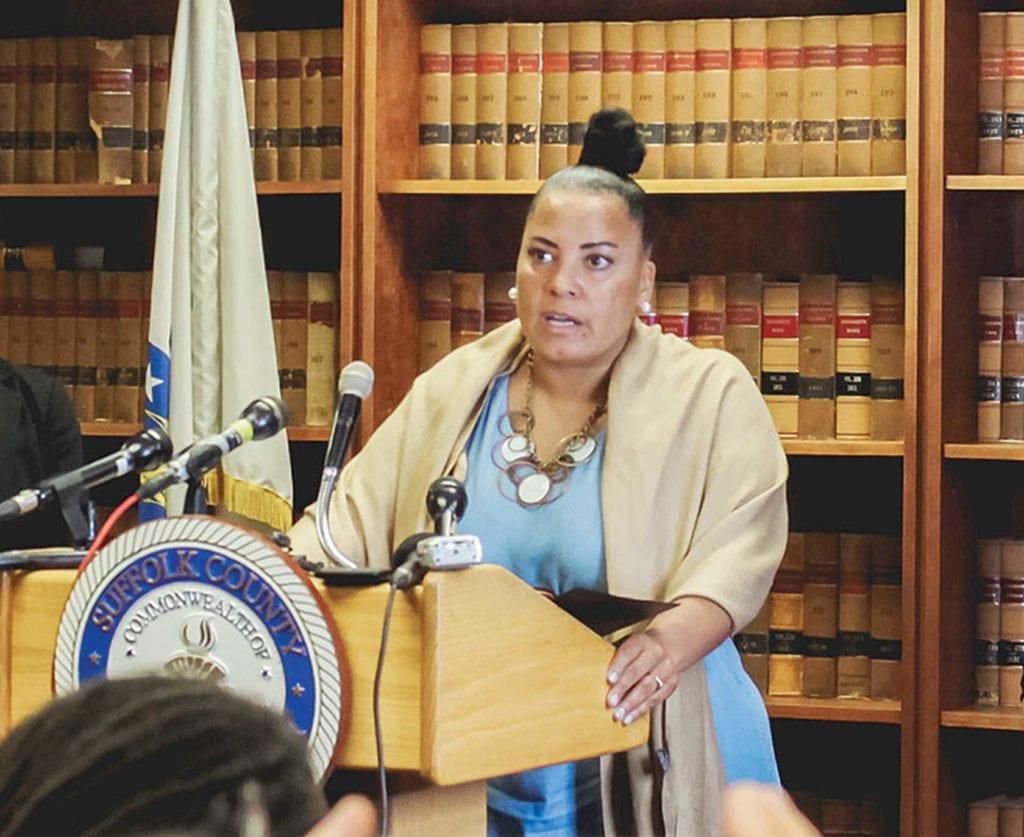SJC justice backs Rollins in spat with judge
Judge overstepped authority in push to prosecute disorderly conduct case

District Attorney Rachael Rollins again found herself in the crosshairs of critics after her office declined prosecution in the cases of several counter-demonstrators arrested during the so-called ‘Straight Pride” parade Aug. 31.
In all, police arrested 36 demonstrators protesting against the parade, which was organized by a group with ties to white supremacist groups. Rollins’ office moved ahead with charges against eight protestors charged with assault and battery, but declined to prosecute several others who were charged with disorderly conduct.
While district attorneys declining to prosecute misdemeanor crimes is not unheard of, what happened next was one of the more unusual developments in recent Massachusetts judicial history. Boston Municipal Court Judge Richard Sinnott refused to allow the Suffolk County prosecutors to drop charges on the defendants, ordering one man charged with disorderly conduct held on $750 bail.
“The judge doesn’t have the discretion to do that,” notes attorney Carlton Williams, a professor at Cornell University School of Law. “There’s a separation of powers.”
On Monday, a Massachusetts Supreme Judicial Court justice agreed, ruling that “The prosecutor’s sole authority to determine which cases to prosecute, and when not to pursue a prosecution, has been affirmed repeatedly by this court since the beginning of the 19th century.’’
During a press conference Monday, Rollins said the ruling by SJC Justice Frank Gaziano made the separation of powers “crystal clear.”
“We have a really good opinion now telling us something we have known since 1806,” she said, referring to the year of the earliest ruling Gaziano cited.
Gaziano’s Sept. 9 ruling applied to the case of Rod Webber, a demonstrator who was arrested for disorderly conduct. Sinnott’s decision to hold Webber on $750 bail was disproportionate to the crime, Williams said, noting that the charge carries no jail time and a maximum penalty of $150.
“In terms of punishment, it’s the least serious crime you can be charged with in Massachusetts,” he said. “It’s hard to even define what disorderly conduct is. It’s just a little bit above a moving violation.”
During her press conference Monday, Rollins pushed back against allegations by police union officials that she is soft on people who attacked police officers, noting that all eight of the protestors charged with assaulting officers are being prosecuted.
“We moved straight to arraignment,” she said of those who assaulted officers. “So any implication that this office does not take seriously violence against law enforcement or the community is false.”
The confrontation, which unfolded over the last week, underscores a broader clash between Rollins’ criminal justice reform agenda and those in the criminal justice system who prefer the status quo.
“Change is really hard,” Rollins said. “There are lots of people who like the way the system is working right now.”
Rollins stressed that she was elected as a change agent whose agenda, posted on her campaign website, included not prosecuting misdemeanor crimes except in extraordinary cases. She suggested that Sinnott, who was appointed in 2017 by Gov. Charlie Baker, overstepped his boundaries.
“I remind people that appointed individuals don’t get to infuse their own opinions in matters where the people of Suffolk County have spoken,” Rollins said to reporters. “What I’m excited about is that the media finally sees how much power people can wield in a system. Because you happen to be paying attention now, you’re seeing what a lot of poor people … and black and brown people experience with members of the judiciary every day.”
In February, Sinnott presided over two cases that the group Court Watch Massachusetts said underscored his racial bias. In the first case, a black man charged with Class B drug possession was held on $500 bail. In the second, a white woman charged with operating under the influence, reckless endangerment, leaving the scene, and failure to stop for an officer was offered a conditional dismissal with community service.
Attorney Williams said Sinnott’s attack on prosecutorial discretion is made all the more puzzling by the judge’s own history. In 1980, Sinnott, then an investigator with the Suffolk County District Attorney’s office, shot and wounded a U.S. Coast Guardsman in a confrontation during which Sinnott said he was attacked by the man and four other guardsmen.
An assistant district attorney with the Suffolk County District Attorney’s office who was not at the scene of the shooting said the alleged attack by the guardsmen was unprovoked. At the discretion of the district attorney, Sinnott was not charged with a crime.
“Sinnott personally benefited from the type of prosecutorial discretion he tried to unlawfully override in court this week,” Court Watch Massachusetts posted in a message on Twitter.
Rollins, recounting how she served on the judicial nominating committee under former Gov. Deval Patrick, suggested that the Baker administration needs to diversify the bench.
“I know how much work goes into appointing judges and vetting them,” she said. “We have a lot of work to do. We need to make sure we have a diverse bench that reflects the people of Suffolk County and that is qualified to do the job.”
Asked by a reporter whether she thought Sinnott should continue to hear cases in Suffolk County, Rollins said it’s up to the chief justices of the Massachusetts Trial Court, Boston Municipal Court and the Supreme Judicial Court.
“I would love for you to ask that question of Chief Justice [Pamela] Carey, Chief Justice [Roberto] Ronquillo or Chief Justice [Ralph] Gants,” she said. “But that’s not something I’ll comment on now.”







